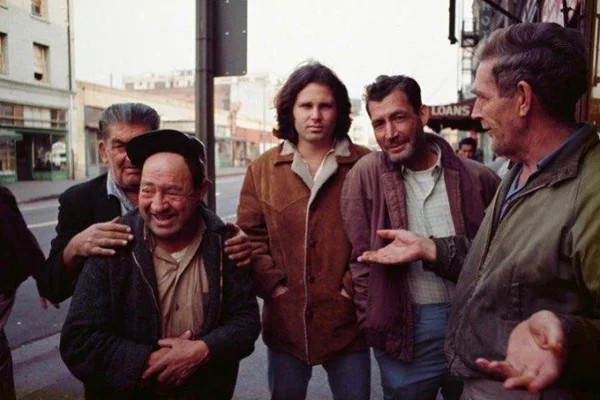Once derided as a “popcorn actress,” Demi Moore may have landed herself a spot in the Oscars’ best actress category with her rousing speech after winning a Golden Globe for The Substance, a role she got when she was at a low point in her career, thinking she was done.
In the summer of 1978, I found myself standing at the front door of an apartment on Kings Road in West Hollywood, feeling a little uneasy. My tennis partner—a kid who shared my passion for the sport but clearly lacked my reservations about introducing strangers—had promised me a story. “She’s beautiful,” he said of his high school classmate. “She’s gonna be a big star one day.”
He wasn’t wrong.

But that afternoon, when the door opened, the girl wasn’t the first thing I noticed. Instead, it was her mother, a chain-smoking woman in her 30s who greeted us with the kind of unsteady charm that comes from a few too many cocktails before sundown. She asked if I wanted a drink, then invited me to meet her daughter by the pool. I followed reluctantly. Something about the whole situation felt off, as if the mother was auditioning me instead of the girl.
The pool was indoors, dimly lit, and nearly empty except for a teenage couple who seemed eager to be left alone. And there, in the shallow end, was Demi Guynes—just 15 years old, though her poise and beauty gave her an ageless quality. She was striking, with dark, luminous eyes that seemed to hold the weight of someone twice her age. I declined the interview that day. The circumstances were too uncomfortable, and I told myself I had an appointment elsewhere. But weeks later, I met her again under less fraught conditions.

By then, I was struck by her ambition. She wasn’t shy about her dreams of stardom. If anything, she was already carrying herself as if the world should take notice. What I didn’t know then was the depth of the struggles that had shaped her.
Demi Moore didn’t come to Hollywood on a Greyhound bus, but her journey was no less emblematic of the starlets who arrive in Tinseltown chasing dreams with nothing but grit to guide them. She had grown up in chaos—her childhood marked by instability, neglect, and trauma. Born in Roswell, New Mexico, her early years were spent shuttling between homes, her family constantly on the move. By the time she was a teenager, she had endured more hardship than many people face in a lifetime.

At 16, she dropped out of Fairfax High School. At 17, she married Freddy Moore, a musician twice her age whose last name she would keep long after their divorce. And by her early 20s, she had worked her way into Hollywood, first through soap operas and later with the Brat Pack films that defined an era.
But Demi was never content to be a poster child for the 1980s. She had an edge, a sense of purpose that distinguished her from her contemporaries. With films like Ghost, she became a bona fide superstar. It was a role that showcased her vulnerability and strength in equal measure, catapulting her into the kind of fame that few achieve.

Yet for all her success, Moore’s career was a high-wire act. For every A Few Good Men, there was a Striptease, a film that amplified Hollywood’s obsession with her body at the expense of her talent. She became one of the highest-paid actresses of her time, but the spotlight wasn’t always kind. The tabloids thrived on her personal life, dissecting her marriages, her parenting, and even her attempts to age gracefully in an industry notorious for discarding women over 40.
And discard her it did. For a time, Moore seemed to fade from Hollywood’s radar. The roles that once came easily were no longer there. The whispers grew louder: Was her time up?
But Demi Moore has never been one to bow to expectations.
In 2025, she’s back in the limelight with The Substance, a film as provocative as her career has been. Part sci-fi parable, part horror story, it’s a blistering critique of society’s obsession with youth and beauty. Moore plays Elisabeth Sparkle, a once-iconic fitness TV star who makes a Faustian bargain to reclaim her lost fame. The film is grotesque, audacious, and deeply unsettling—a perfect vehicle for Moore to confront the very industry that once celebrated and then sidelined her.
What’s remarkable about Demi Moore isn’t just her longevity, though that alone is a feat in Hollywood. It’s her ability to adapt, to weather storms both personal and professional, and to emerge on the other side with her integrity intact. She’s lived through trauma that would have broken many—growing up with a mother whose own demons cast long shadows, enduring the heartbreak of public divorces, and facing the relentless scrutiny of a world that often values women only for their youth.
Through it all, Moore has refused to be defined by her setbacks. She’s a survivor in the truest sense, someone who has taken the blows life dealt her and turned them into a kind of armor.
Her performance in The Substance is a testament to that resilience. Elisabeth Sparkle’s story is both a cautionary tale and a mirror held up to Hollywood’s ugliest truths. The film doesn’t just ask us to consider the cost of chasing eternal youth; it forces us to confront the systems that demand it in the first place.
Demi Moore knows these pressures all too well. She’s lived them. But she’s also defied them, proving that reinvention is always possible. At 62, she radiates the kind of confidence that can only come from having survived the fire.
Looking back on that day in 1978, I see now what I didn’t fully grasp then. Demi wasn’t just a girl with dreams of stardom. She was a force, even if the world hadn’t yet recognized it. The sadness in her eyes wasn’t just a reflection of her past; it was the depth of someone who already understood what it would take to make it.
Today, she stands as one of Hollywood’s great paradoxes: a star who has endured without losing her humanity, a beauty who has found power in defying the industry’s rules. Demi Moore didn’t just survive Hollywood. She conquered it on her own terms.
And isn’t that the greatest story of all?
TONY CASTRO, the former award-winning Los Angeles columnist and author, is a writer-at-large and the national political writer for LAMonthly.org. His forthcoming novel, THE BOOK OF MARILYN, will be published in 2025. He can be reached at tony@tonycastro.com.





